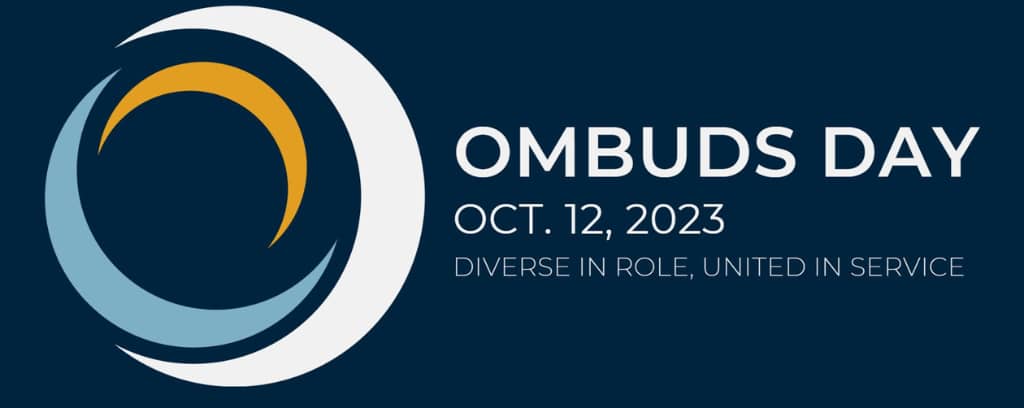Conflicts are inevitable in business and life. The ability to effectively resolve them is critical for maintaining a peaceful and productive work environment. Yet some employment conflicts become too explosive or feel too personal for us to resolve without assistance. This is where an ombud comes into play.
What is an Ombud, Ombudsman, or Ombudsperson?
An ombud is a neutral third-party trained in alternative dispute resolution (ADR). She is often a mediator and skilled in trauma-informed services. As a neutral, her role is to keep you out of court and other administrative proceedings that require you to surrender control. She can help you and your employees informally resolve individual and systemic issues by:
- Narrowing the issues
- Developing options for resolving them
- Reducing the human and organizational costs of conflict
What is Ombuds Day?
Ombuds Day is a day dedicated to outreach. Although Sweden first appointed an ombudsman to its parliament in the 1800s, many people and organizations still don’t know what an ombud is or how one can benefit them.
In 2018, the American Bar Association hosted its first Ombuds Day to raise awareness and increase access to justice for those whose issues require court intervention. Unfortunately, we know that many more cases can be resolved informally than are currently stalled by court backlogs.
Ombuds Day is celebrated annually on the second Thursday in October throughout the world.
Which Organizations Have or Use Ombuds?
Ombuds are not limited to any specific industry or sector. They are found in a wide range of organizations, including:
- Businesses. Whether you are an executive in an international corporation or CEO of a small, local service business, you can affordably work with an ombuds to address workplace conflicts. From employee performance and partnership disputes to ethical concerns and compliance, she can help you speed the process to real solutions and keep your business focused on what makes it most successful.
- Educational Institutions. Universities and schools have ombuds offices to support students, faculty, and staff with the many challenges that arise in academic life. In 1966, Eastern Montana College appointed the first higher education ombud in the United States. Many more colleges and universities added ombuds offices in the coming years, in response to campus protests and unrest during the Vietnam War. Currently, an estimated 200 North American institutions have such offices.
- Government Agencies. Federal, state, and local government entities often utilize ombuds to enhance transparency and accountability in their operations. For example, the US Department of State and New York City Department of Homeless Services have ombuds offices to address citizen concerns.
- Not-for-Profit Organizations. Ombuds have helped nonprofit corporations manage internal and external conflicts. They can ensure fair treatment of employees and address the concerns of other stakeholders, such as donors and media.
Key Benefits of Ombuds Services
Like a mediator, an ombuds can provide:
- Confidentiality – a secure, confidential space for individuals to express their concerns without fear of repercussions
- Impartiality – a fair and unbiased approach to conflict resolution
- Informal Resolution – avoiding the need for a formal legal process
- Early Intervention – resolving conflicts before they escalate; saving time, money, and preserving relationships
How an Employment Attorney and Mediator Can Serve as Your Ombuds
Here’s how employment attorneys and mediators can benefit your organization when serving as ombuds:
- Conflict Resolution Experience. Skilled in litigation and transactions, I know the costs and risks of going to court. I can facilitate productive dialogues and mediate conflicts large and small.
- Legal Knowledge. An understanding of employment law is essential when navigating complex workplace issues. I have this understanding, as well as experience in human resources. As a plaintiff, I also won a judgment against a prior employer.
- Impartiality. My commitment to neutrality and fairness aligns with an ombud’s core principles, ensuring a just resolution process.
- Confidentiality. Mediators and attorneys already adhere to strict confidentiality standards, making this a seamless transition into the ombuds role. If you’re not happy with my services, you can complain to the courts.
Ombuds Day reminds us of the importance of resolving conflicts in a fair and constructive manner. An ombuds can help you build more peaceful and productive work experiences for everyone involved. This has a lasting impact on the people within your organization and all those around them.
Does your organization need an ombud?
https://thirdearcr.com/employment-mediation-benefits/

